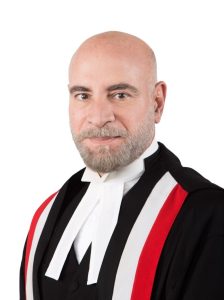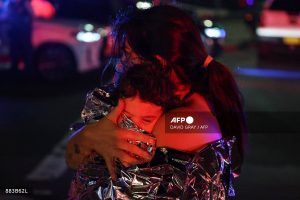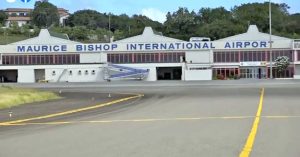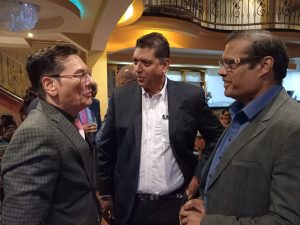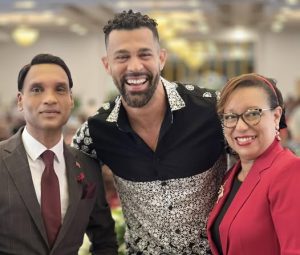TWO journalists from Agence France-Presse (AFP) were barred from the post-Cabinet press conference with government officials in Trinidad and Tobago on Thursday.
Videographer Juanes Restrepo and photographer Martin Bernetti, who have been in Trinidad since Saturday covering the docking of a U.S. warship, were not allowed into the Diplomatic Centre in St Ann’s.
When asked why the journalists were barred, Parliament Secretary in the Office of the Prime Minister Nicholas Morris said he was not aware of the situation. Pressed further, he said, “This is the Diplomatic Centre. Once they provide their credentials, they will be allowed in.”
He promised to look into the matter after being told that Restrepo and Bernetti had presented their press passes. The journalist were never allowed into the press conference.
Morris said the Government was not avoiding international media.
Present at the press conference were Minister of Foreign and CARICOM Affairs Sean Sobers and Minister of Rural Development and Local Government Khadijah Ameen.
Morris said, “This Government in the past week has subjected itself to international media at Minister Sobers’s press conference at his office on Sunday. Jim from Bloomberg was there in his conference room. In the parliament, in front of the parliament, international journalists were there and they spoke to us. So, the government is not running—let me beat that down one time.”
Only local journalists were at the press conference.
During the past weeks as tensions between America and Venezuela mounted with US strikes on “narco traffickers” a number of foreign media houses had journalists in Trinidad. They included, The News York Times, the Wall Street Journal, Bloomberg, Al Jazeera and NPR.
The USS Gravely docked in Port of Spain on Sunday for training exercises with the Trinidad and Tobago Defence Force and Coast Guard, and left on Thursday. With the Gravely docked within firing range of mainland Venezuela, the Venezuelan government denounced the U.S. presence in Trinidad and Tobago as an act of “military provocation,” conducted in coordination with the CIA and aimed at provoking war in the Caribbean.
The government had indicated the Gravely was in Trinidad and Tobago to participate in joint training exercises with the Trinidad and Tobago Defence Force and Coast Guard, noting that similar exercises had been carried out in the past and that this visit had nothing to do with the conflict between the United States and Venezuela. Venezuela, however, continued to accuse Prime Minister Kamla Persad-Bissessar and her government of working with the U.S. to overthrow the Nicolás Maduro regime.
On Monday, Venezuelan Vice President Delcy Rodríguez announced that a proposal was being taken to the board of the state-owned energy company Petróleos de Venezuela, S.A. (PDVSA) to terminate the Energy Cooperation Framework Agreement between the two countries. The move would spell the end of the 30-year lease granted to the National Gas Company (NGC) to explore and exploit the natural gas reserves in the controversial Dragon Gas field. Rodríguez stated that, without PDVSA’s and Venezuela’s support, Trinidad and Tobago’s energy sector would suffer.
In response, Persad-Bissessar—who had long been vocal in her support for U.S. intervention against the drug trade in the Caribbean—pushed back at Rodríguez, stating that Trinidad and Tobago’s growth and economic stability were not solely dependent on Venezuelan gas. She said, “Our future does not depend on Venezuela and never has. We have our plans and projects to grow our economy in both the energy and non-energy sectors.”
On Tuesday, the Venezuelan National Assembly (AN) unanimously approved a declaration deeming Persad-Bissessar “persona non grata,” citing her alleged role in a “criminal conspiracy” with the U.S. military to attack Venezuela. The declaration accused Persad-Bissessar of conspiring with the U.S. in a “systematic plan against the peace of Venezuela.”
Responding, Persad-Bissessar stated that the declaration would not affect her or her government in carrying out their duties. She has remained steadfast in her support of U.S. intervention in South America and the Caribbean, despite criticisms from other CARICOM nations, which she says do not suffer the same effects of cartel activity in their countries as Trinidad and Tobago does.
The USS Gravely was one of seven warships deployed to the Caribbean by the U.S. government as part of an exercise to combat Venezuelan drug cartels. To date, U.S. strikes on alleged drug-smuggling boats in international waters in the Caribbean and Pacific have killed at least 62 people, including two Trinidad and Tobago nationals.
AFP journalists gave full coverage to all of these stories and more.
About AFP
Agence France-Presse (AFP) is a global news agency headquartered in Paris, founded in 1944 by Charles-Louis Havas as a successor to Havas and the precursor to many modern wire services. AFP operates as a cooperative-owned newsroom, delivering fast, multilingual coverage across text, photo, video, and graphics to media clients around the world. With bureaus on every continent, AFP emphasises accuracy, independence, and editorial integrity, offering services in multiple languages (including French, English, Spanish, Arabic, Portuguese, and more). In addition to breaking news, AFP provides in-depth features, data journalism, and multimedia storytelling, adapting to digital platforms and the evolving needs of modern newsrooms.
![]()






